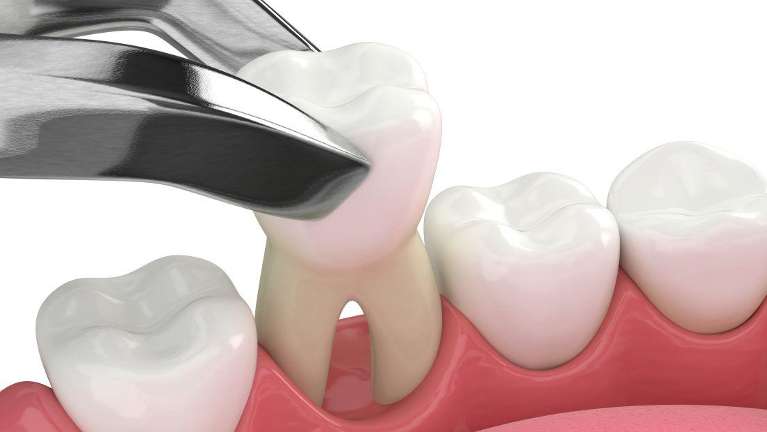
No one wants to go to the dentist, thinking their oral health is intact, only to find out they need to have a tooth extracted. In my dental office, we perform extractions only as a last resort after we explore all other treatment options. Sometimes, removing your tooth is the best way to keep your mouth healthy.
Fortunately, tooth extractions are often very straightforward, and we offer many different options for replacing your tooth once it has been removed. In this blog, I will discuss all aspects of extractions, including the different types, why I recommend them, what you can expect regarding your healing, and effective strategies for speeding up your recovery.
I’ll also discuss possible tooth replacement options to get your smile back on track. Keep reading to learn everything you need to know about tooth extractions in Winston-Salem, NC.
Understanding the Types of Tooth Extraction
Understanding the two different types of tooth extraction is essential so you know what to expect when I perform this procedure. After formulating your treatment plan, I will discuss this with you. The two ways I can extract your tooth are as follows:
- Simple extraction—As the name implies, a simple extraction is performed by gently loosening and removing your tooth with a special dental instrument. This type of extraction takes only a few minutes. I will administer local anesthesia before the procedure so you won’t feel any pain.
- Surgical extraction—Sometimes, I have to perform a surgical extraction. Again, I will use local anesthesia so you will be comfortable during the procedure. When your tooth can’t be accessed easily or is impacted, I may have to make an incision in your gums to remove it. Sometimes, I have to remove some bone around your tooth or separate your tooth into sections and remove it in pieces.
Common Reasons for Removing Teeth
As I stated earlier, I want nothing more than to help you save your natural teeth; preventive dentistry is the cornerstone of my dental philosophy. However, there are several reasons why your tooth may need to be extracted, including the following:
- Severe decay—Tooth decay is a common reason for extraction; if your tooth is damaged beyond repair and can’t be restored with a tooth-colored filling or dental crown, I must remove it to prevent the infection from spreading.
- Gum disease—Your teeth may become loose if you have advanced periodontitis. I may have to remove one or more of your teeth to preserve your oral health.
- Impacted wisdom teeth—Sometimes, your wisdom teeth don’t have enough room in the back of your mouth to come through correctly. You may experience pain or swelling when this happens, so it’s best for me to perform one or more surgical extractions.
- Orthodontic treatment—Sometimes, you may need to have one or more teeth extracted to create the necessary space to properly align your teeth, either with traditional braces or clear aligners.
- Trauma—When my patients sustain a sports injury or are involved in an accident, I may have to extract any teeth that are damaged beyond repair.
What Can I Expect from the Healing Process?
Although every patient is different, there is a typical healing timeline after I extract a tooth. Here’s what you can expect once your tooth has been removed:
Immediately afterward—Once we remove your tooth, I will place gauze over the extraction site and ask you to bite down on it. This will help control the bleeding. I will instruct you to rest, avoid strenuous activity for at least 24 hours, and place ice packs on your face to reduce swelling. Depending on the type of extraction, I may prescribe pain medication or recommend an over-the-counter pain reliever.
The first few days—It’s perfectly normal for you to experience some discomfort, swelling, or minor bleeding for a few days after I extract your tooth. It would be best to rinse your mouth with warm salt water on the days following the procedure and avoid hot and spicy foods. Be careful to chew on the opposite side of your mouth, too.
After one week—You should feel much better and only have slight discomfort at the extraction site. It’s still normal for the area to be tender, so be careful about biting down on anything hard or crunchy on that side of your mouth. Also, practicing good oral hygiene is essential to keep the area clean. Be sure to brush and floss each day and rinse with antibacterial mouthwash.
Completely healed—A blood clot will form in the extraction site over the next few weeks, protecting the bone and nerves from damage and infection. Your mouth will no longer be sore or tender, and we can begin to discuss your tooth replacement options. My dental office can fill the gap in your smile with dental implants, partial or full dentures, implant-supported dentures, or a dental bridge.
Speeding up the Recovery Process
I recommend some easy tips to help my patients recover as quickly as possible from an extraction. While it’s true that it will take time to heal, there are some things you can do to feel better faster:
- Follow my instructions—My dental team and I will give you the necessary instructions to follow after your extraction. It’s best to follow them by taking your prescribed medications, avoiding too much activity, eating only certain types of food, and visiting my dental office for follow-up appointments.
- Practice oral hygiene—After the first 24 hours, I ask you to brush gently around the extraction site and rinse with warm salt water. This will help keep the extraction site clean and free from infection and help you heal faster.
- Eat soft foods—It’s best to stick to eating only soft foods for several days after I remove your tooth. The less you irritate the extraction site, the faster you will heal, so avoid crunchy or sticky foods altogether. Eat things like oatmeal, yogurt, scrambled eggs, and pudding.
- Stay hydrated—It’s good for your overall health to stay hydrated, but drinking water can rinse bacteria from your mouth, which can help you avoid infection. Be careful not to drink from a straw because it can cause a dry socket.
- Avoid smoking and alcohol—I always tell my patients it’s best not to smoke or drink alcohol as it can cause complications and slow the healing process. Avoid both if possible.
- Take medications—If you need pain relief, don’t hesitate to take over-the-counter pain relievers. Ibuprofen and acetaminophen are great for reducing swelling, too.
Questions about Tooth Extraction Healing Time in Winston-Salem, NC?
If you need more information about tooth extraction or anything associated with this standard dental procedure, please get in touch with my dental team! At Blake Nelson DDS, we aim to help you achieve and maintain the best oral health possible.
We will keep you informed and comfortable during the process and offer support once you leave our dental office. Before you know it, your dental extraction will be a distant memory, and you’ll enjoy a healthy smile again.
To schedule an appointment or ask a question, contact me at (336) 760-1277.

